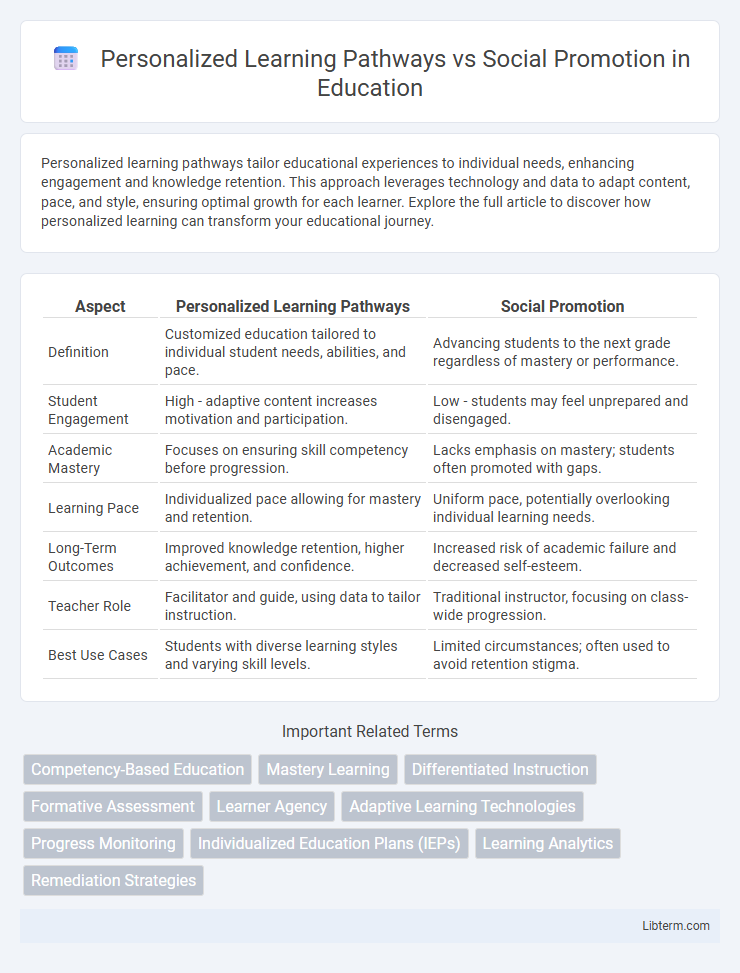Personalized learning pathways tailor educational experiences to individual needs, enhancing engagement and knowledge retention. This approach leverages technology and data to adapt content, pace, and style, ensuring optimal growth for each learner. Explore the full article to discover how personalized learning can transform your educational journey.
Table of Comparison
| Aspect | Personalized Learning Pathways | Social Promotion |
|---|---|---|
| Definition | Customized education tailored to individual student needs, abilities, and pace. | Advancing students to the next grade regardless of mastery or performance. |
| Student Engagement | High - adaptive content increases motivation and participation. | Low - students may feel unprepared and disengaged. |
| Academic Mastery | Focuses on ensuring skill competency before progression. | Lacks emphasis on mastery; students often promoted with gaps. |
| Learning Pace | Individualized pace allowing for mastery and retention. | Uniform pace, potentially overlooking individual learning needs. |
| Long-Term Outcomes | Improved knowledge retention, higher achievement, and confidence. | Increased risk of academic failure and decreased self-esteem. |
| Teacher Role | Facilitator and guide, using data to tailor instruction. | Traditional instructor, focusing on class-wide progression. |
| Best Use Cases | Students with diverse learning styles and varying skill levels. | Limited circumstances; often used to avoid retention stigma. |
Understanding Personalized Learning Pathways
Personalized learning pathways tailor educational experiences to individual student needs, strengths, and pace, enhancing engagement and mastery of concepts. These pathways leverage adaptive technologies and data-driven assessments to create customized content and feedback loops. This approach contrasts with social promotion, which advances students based on age or grade level rather than demonstrated competency, potentially leading to skill gaps and disengagement.
Defining Social Promotion in Education
Social promotion in education refers to advancing students to the next grade level regardless of their academic performance, rather than based on mastery of curriculum standards. This practice aims to maintain students' social and emotional development by keeping them with age peers, but often leads to gaps in knowledge and skills. Contrasted with personalized learning pathways, which tailor instruction to individual needs and competencies, social promotion may undermine long-term academic success.
Key Differences Between Personalized Learning and Social Promotion
Personalized learning pathways tailor education to individual students' strengths, weaknesses, and interests, promoting mastery before progression, while social promotion advances students based solely on age or grade level regardless of academic readiness. Unlike social promotion, which risks widening learning gaps by moving students forward without adequate understanding, personalized learning emphasizes adaptive instruction using data-driven assessments to ensure competency. This approach fosters engagement, motivation, and long-term success by aligning curriculum and pacing with each learner's unique needs rather than adhering to uniform grade-level standards.
Benefits of Personalized Learning Pathways
Personalized learning pathways adapt educational content to individual student strengths, weaknesses, and interests, enhancing engagement and retention. This approach fosters mastery of concepts at a personalized pace, reducing gaps in knowledge that social promotion often overlooks. Students experience increased motivation and confidence by receiving targeted support and challenge tailored to their unique learning needs.
Drawbacks of Social Promotion
Social promotion often results in students advancing without mastering essential skills, leading to gaps in learning and increased dropout rates. This practice can lower overall academic standards and negatively impact student motivation and self-confidence. In contrast, personalized learning pathways address individual needs, promoting mastery and long-term educational success.
Impact on Student Engagement and Motivation
Personalized learning pathways significantly increase student engagement and motivation by tailoring content to individual interests and skill levels, fostering a sense of ownership and relevance in learning. In contrast, social promotion often leads to disengagement as students may feel unchallenged or overwhelmed when advanced without mastering key concepts. Research highlights that personalized approaches improve academic outcomes and sustain motivation by addressing diverse learning needs and promoting mastery-based progression.
Addressing Academic Gaps: Tailored Instruction vs. Social Advancement
Personalized learning pathways use data-driven assessments to identify and address individual academic gaps with customized instruction, ensuring mastery before progression. Social promotion advances students to the next grade based on age or social factors rather than academic readiness, often leading to unresolved learning deficiencies. Tailored instruction in personalized pathways improves long-term student outcomes by targeting specific skill deficits, while social promotion risks cumulative knowledge gaps and decreased academic confidence.
Equity and Inclusion Considerations
Personalized learning pathways foster equity and inclusion by tailoring education to individual student strengths, needs, and cultural backgrounds, ensuring diverse learners receive appropriate support and challenges. Social promotion often overlooks these differences, potentially perpetuating achievement gaps and disadvantaging students from marginalized communities. Implementing personalized strategies enhances engagement and outcomes by addressing systemic barriers and promoting equal opportunities for academic success.
Teacher and Parent Roles in Each Approach
Teachers in personalized learning pathways assess individual student strengths and tailor instruction accordingly, collaborating closely with parents to set goals and monitor progress. In social promotion, educators often face pressure to advance students regardless of mastery, requiring parents to provide additional support outside the classroom to address learning gaps. Both approaches demand active communication between teachers and parents, but personalized learning emphasizes joint decision-making and customized interventions.
Future Trends: Shaping Education Policies
Personalized learning pathways leverage adaptive technology and data analytics to tailor education to individual student needs, enhancing engagement and mastery of skills. Future education policies increasingly emphasize competency-based progression over social promotion, ensuring students advance by demonstrating proficiency rather than age or grade level. Emerging trends highlight the integration of AI-driven assessments and personalized interventions as critical tools for shaping policies that prioritize student success and equity.
Personalized Learning Pathways Infographic

 libterm.com
libterm.com